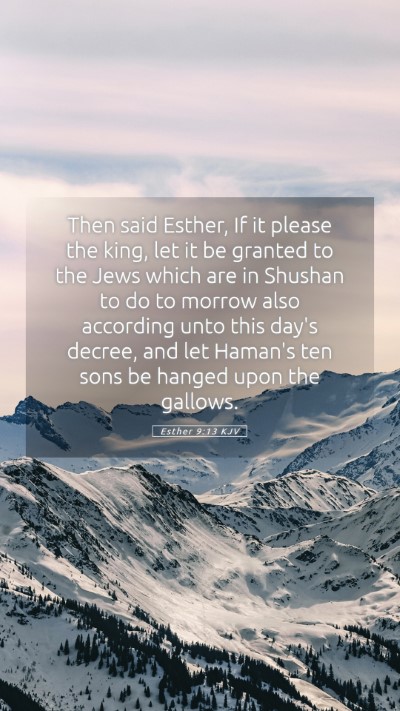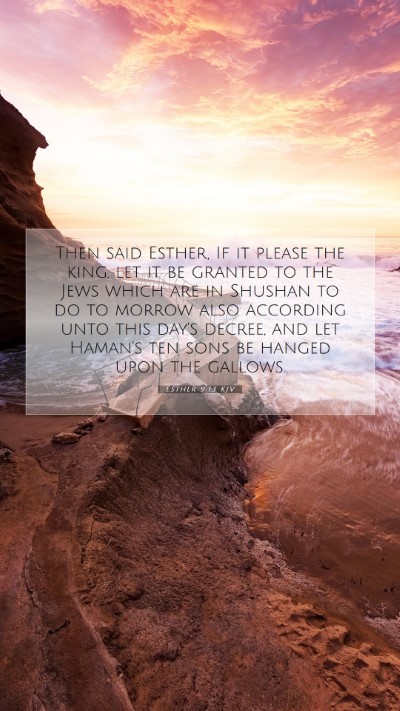Understanding Esther 9:13: Biblical Commentary and Insights
Esther 9:13 states: "And Esther said, The king hath granted to the Jews which are in Shushan to do
to-morrow according to this day's decree. But this is done, that the Jews which are in Shushan
should make a further request, that they may do the same to the Jews which are in the king's
provinces. And they may receive a decree to kill and destroy and to perish."
This verse encapsulates a pivotal moment during the celebration of Purim, where the Jews express a
desire for additional protection and retribution against their enemies. The understanding of this
verse can be gathered through a synthesis of insights from notable commentaries, yielding a
comprehensive explanation of its implications.
Verse Context and Historical Background
To grasp the meaning of Esther 9:13, it's essential to consider the historical backdrop of the book of
Esther. The events unfold in Persia during a time when Jews were facing potential annihilation due
to a decree influenced by Haman. The ultimate salvation of the Jewish people came as a result of
Esther's courage and strategic planning.
Combined Commentary Insights
-
Matthew Henry:
Henry emphasizes the significance of Esther's plea, portraying it as a crucial moment where
Esther, having received favor from the king, seeks to ensure the safety of her people. His
commentary highlights her role not only as a queen but also as a mediator for her people,
showcasing the dangers they faced and the urgent need for protection in a hostile environment.
-
Albert Barnes:
Barnes focuses on the procedural aspects of Esther's request. He acknowledges the existence
of two distinct decrees, one allowing the Jews to defend themselves and another that
empowers them to retaliate against their enemies. Thus, this verse indicates the ongoing
struggle and the urgent necessity for Jews to secure their well-being through legitimate
requests to the king.
-
Adam Clarke:
Clarke adds a deeper reflection on the nature of decrees and their Biblically-rooted origins.
He explains how Esther's plea prompts a further request for clarification and expansion of
existing decrees to ensure that the plight of the Jews is adequately addressed. Clarke's
analysis centers on the themes of justice and divine intervention, connecting the Jews’
actions with their faith in God's providence.
Theological Reflections
Esther 9:13 serves as a powerful reminder of the importance of faith and action in the face of
adversity. The Jewish people, having been delivered from destruction, are encouraged to honor that
deliverance through decisive actions, calling upon the king for further support. This reflects a
model of proactive faith where believers seek God's justice and intervention.
Applications for Modern Believers
The verse's call for believers to seek out protection and act against threats resonates with
contemporary faith practices. It emphasizes several key applications:
-
Seeking Justice:
Believers are encouraged to pursue justice actively, mirroring the actions of Esther and the
Jews in their endeavor to seek further protection from their enemies.
-
Faithful Requesting:
The model provided by Esther teaches the value of presenting legitimate requests in faith,
trusting in God's favor and provision in one's life.
-
Community Support:
Esther's actions depict the importance of communal support among the faithful, suggesting
that in times of difficulty, unity and collective prayer can lead to divine intervention.
Related Scriptural References
To fully understand the significance of Esther 9:13, consider these related scriptures:
- Esther 3:8-9 - The origin of the decree against the Jews.
- Esther 8:11-12 - The first decree allowing the Jews to defend themselves.
- Nehemiah 4:9 - A parallel call for prayer and action during perilous times.
Conclusion
Esther 9:13 ultimately reflects a profound example of courage, faith, and the pursuit of justice. The
rich insights from public domain commentaries provide a deeper understanding of this verse, offering
valuable lessons for those seeking Bible verse meanings, Bible verse interpretations,
and much more. As believers engage with this scripture, they can find encouragement to uphold
their faith and invoke the spirit of proactive trust in God amidst their challenges.


